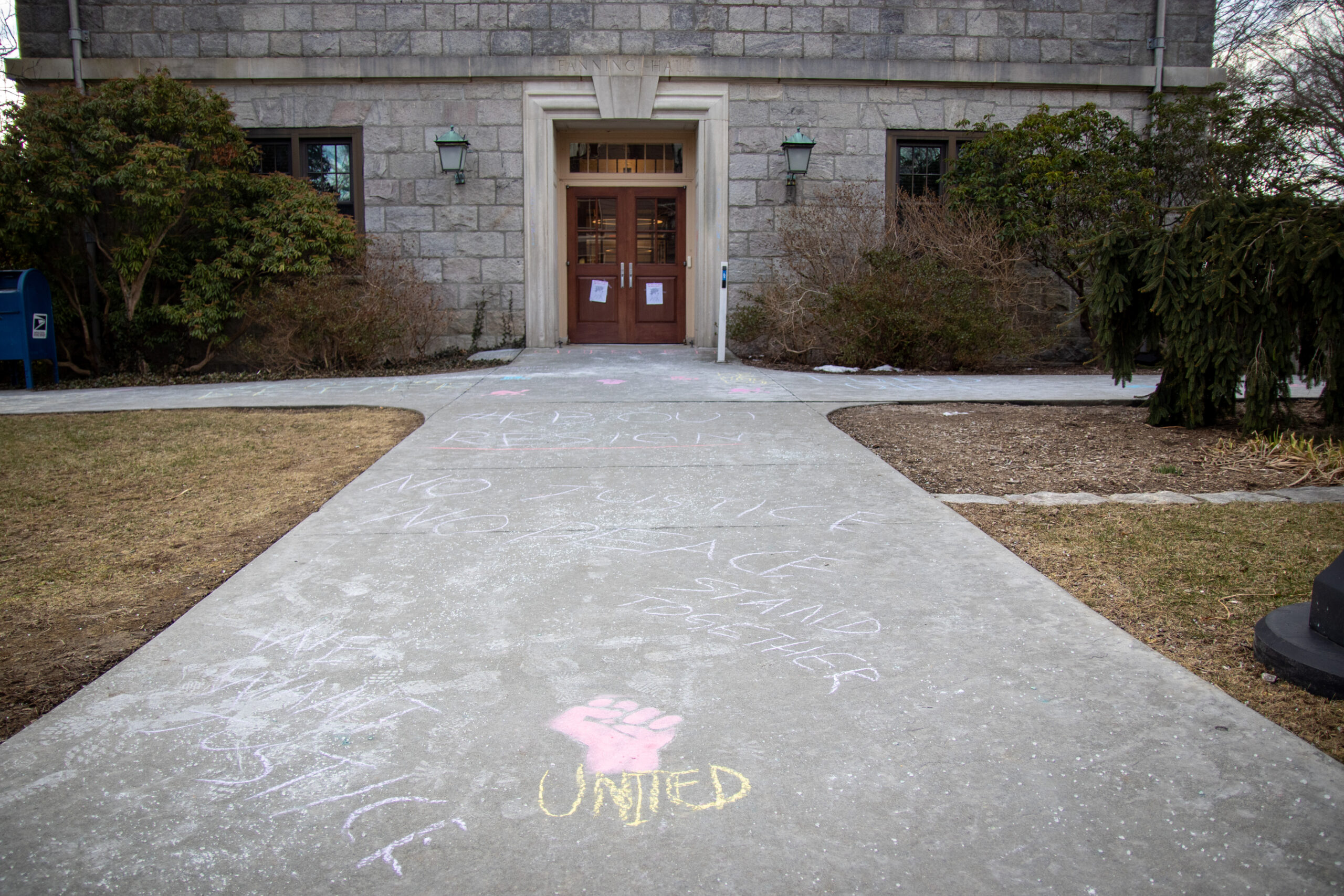Photo courtesy of Robbie Lynch ’24
To the Editor:
It’s time to show the admin who runs Conn. It’s time for a student/worker union.
As alumni of Connecticut College, we have been following the recent occupation of Fanning Hall with great interest and concern. It is clear that, since the building’s last takeover in 2016, the College administration has failed to prioritize the critical work of institutional diversity, equity and inclusion. We strongly support current students, faculty and staff in their struggle to make Conn a more just and equitable community.
The fact that Fanning Hall had to be occupied for a second time in under a decade reveals that Conn students, faculty and staff still have too few formal channels for influencing decision making at the College, which remains concentrated in administrative hands. We believe this is a troubling sign. A college is an institution of learning and a place of work—as such, it ought to be shaped by learners, educators and workers, not by administrators who are structurally disconnected from (and surplus to) those basic functions. Students and workers need the power to make decisions at the College without needing to appeal to the goodwill of individual administrators, whether it be Katherine Bergeron or a more worthy successor. Simply put, there needs to be a way to compel Conn administrators to listen to students and workers, whether or not they feel like it.
As graduate student workers at Harvard and MIT, we have experienced firsthand the transformative power of a legally-recognized labor union in getting institutions to heed our concerns. We are not alone. Higher education workers—be they undergrads, grad students, contingent faculty, or staff—have been unionizing in record numbers across the country and winning everything from better working and learning conditions to essential anti-discrimination protections.
Last month, unionized undergraduate residence life workers at nearby Wesleyan won yearly raises of up to 70% (Conn is not required to give undergrad workers any yearly raises at all). At Yale, unionized dining, custodial and facilities staff resisted university attempts to furlough them during the pandemic (many Conn staff were furloughed with a pay cut during Covid). At The New School, part-time faculty went on strike to win a 6-year minimum for multi-year appointments (Conn has no minimum). Other unionized workers have been demanding an end to racist policing on campus, justice for survivors of harassment, a transformative curriculum, and much more. The sky’s the limit when you can threaten to withhold the labor that runs your university.
At a moment of profound imagination and hope for Conn’s future, we wonder: why shouldn’t workers at Conn join millions across the country in asserting their rights by unionizing? By joining the burgeoning labor movement, Conn’s workers—students, staff and non-tenure track faculty—stand to win the many protections that collective bargaining offers, not least of which is a guaranteed say over the college’s operations—regardless of whether administrators prefer to grant one.
Many of SVE’s demands bring up labor conditions and compensation. You may well win these demands thanks to the pressure you are creating with the Fanning occupation. But even if you are successful in winning a stronger DIEI office, a better wage for DIEI staff, and more diverse course offerings, we urge you to consider that an administration that can grant these demands can also take them away at any time. The only way to prevent this is to make a structural change that takes power away from administrators and puts it directly in the hands of students and workers. A union is one such structural change.
Although unionization will not fill all the gaps in Conn’s lagging commitments to diversity, equity, and inclusion, it would be a big step toward erecting protections for members of the community who have been left, until now, far too vulnerable. It would mean that administrators and trustees could no longer make decisions about you without you.
Conn workers, like workers across the country, are facing demanding workloads that do not align with material remuneration, a problem compounded by an uneven pandemic recovery, high inflation and wage stagnation. As of 2016, many of Conn’s essential workers were making well under $15 an hour even as Katherine Bergeron and her colleagues in Fanning Hall took home discretionary bonuses totaling hundreds of thousands of dollars. This state of affairs can—and must—change if Conn is to be anything resembling a diverse, inclusive, or equitable college.
A campus where workers organize with and look out for one another promises to be a safer and more just community. We urge Conn students to channel the incredible momentum you have built to help your colleagues, as well as the faculty and staff, withstand employer pressures and build strong unions. We, the alumni, as well as a huge and growing labor movement, are here to support that effort however we can.
Aparna Gopalan ‘17 is a member of HGSU-UAW and a graduate student worker at Harvard’s Anthropology department.
Zach La Rock ‘16 is a member of MITGSU-UE and a graduate student worker in the MIT Program on History, Anthropology, and Science, Technology & Society.











When the union’s inspiration through the workers’ blood shall run,
There can be no power greater anywhere beneath the sun;
Yet what force on earth is weaker than the feeble strength of one,
But the union makes us strong.
Solidarity forever,
Solidarity forever,
Solidarity forever,
For the union makes us strong.